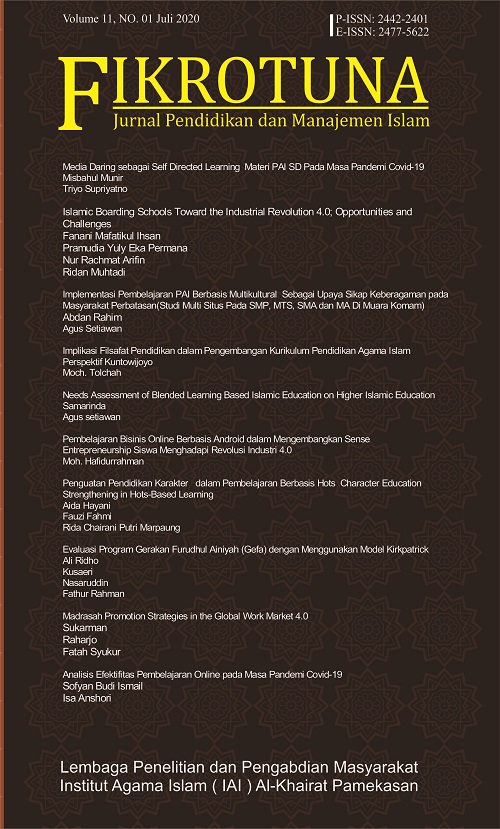Pemikiran Pendidikan Islam dalam Perspektif Zakiah Daradjat
DOI:
https://doi.org/10.32806/jf.v12i01.6881Keywords:
Zakiah Daradjat, Islamic Education, Contribution.Abstract
This study discusses Zakiah Daradjat's perspective on Islamic education and its contribution to Islamic education in Indonesia. The main issues discussed are: (1) The concept of Islamic education according to Zakiah Daradjat; (2) The contribution of Zakiah Daradjat's thoughts about Islamic education to Islamic education in Indonesia. This study used the library research method, with primary data sources obtained from the works of Prof. Dr. Zakiah Daradjat who focuses on 3 (three) books, namely Psychology, Islamic Education, and Religious Education in Mental Development, as well as secondary data sources in the form of books relevant to this research. The data analysis technique used by the author in this study is data triangulation. The results of the discussion concluded: the concept of Islamic education according to Zakiah Daradjat is the essence of forming human beings who have noble morals or in other words morals are good deeds. Morals are a reflection of faith in the form of behavior, speech, and attitude. Because Islamic education is not merely religious education, but the cultivation of a religious spirit by accustoming children to good qualities and habits. The goal of Islamic Education is the embodiment of Islamic values in the human person of the student that is endeavored by Muslim educators. The contribution of Islamic education thought initiated by Zakiah Daradjat can be seen theoretically, namely: The components of Islamic education according to him are educators, students, educational methods, and curriculum which are an inseparable unit, one with the other equally taking part in achieve the goal, namely to create a generation of good morals. In practice, he was a reformer of Islamic education in his dayReferences
Aljunied, Khairudin. Islam as Therapy: Zakiah Daradjat and the Uses of Religious-Oriented Psychology. Indonesia and the Malay World 49, no. 143 (2021): 106-125.
Damsir, Damsir, and Muhammad Yasir. Pemikiran Pendidikan Islam Zakiah Daradjat Dan Konstribusinya Terhadap Pendidikan Islam Di Indonesia. An-Nida 44, no. 2 (2020): 213-227.
Daradjat, Zakiah. Metodik Khusus Pengajaran Agama Islam, 2016.
Perkembangan Psikologi Agama Dan Pendidikan Islam Di Indonesia. Jakarta Selatan: PT Logos Wacana Ilmu (1999).
Darajat, Zakiyah. Ilmu Pendidikan Islam. Jakarta: Bumi Aksara (n.d.).
Ilmu Pendidikan Islam Edisi Revisi 1 Cetakan Ke-4. Jakarta: Bumi Aksara (2000).
Pendidikan Dalam Keluarga Dan Sekolah. Jakarta: Rohana (1993).
Pengajaran Agama Islam. Jakarta: Bumi Aksara (2008).
Drajat, Zakiyah. Membina Nilai-Nilai Moral Di Indonesia. Cet. IV Jakarta: Bulan Bintang (1985).
Fitriyanto, Rahmad. Pendidikan Karakter Menurut Zakiyah Daradjat Dan Relevansinya Dengan Pendidikan Agama Islam. UIN SUNAN KALIJAGA, 2014.
Harahap, Hotni Sari, and Khairun Nisa Pasai. Pengembangan Manajemen Kurikulum Di Madrasah Aliyah Muallimin Univa Medan. Tajribiyah: Jurnal Pendidikan Agama Islam 1, no. 1 (2022): 63-72.
Islam, Dewan Redaksi Ensiklopedi. Encyclopedia Islam. : TDV Publishing, Printing and Trading Business, 2001.
Islam, Universitas, Negeri Sultan, and Syarif Kasim. Pemikiran Pendidikan Islam Zakiah Daradjat Dan Konstribusinya Terhadap Pendidikan Islam Di Indonesia 44, no. 2 (2020): 199-213.
Ismail, Ismail, Hapzi Ali, and Kasful Anwar Us. Factors Affecting Critical and Holistic Thinking in Islamic Education in Indonesia: Self-Concept, System, Tradition, Culture.(Literature Review of Islamic Education Management). Dinasti International Journal of Management Science 3, no. 3 (2022): 407-437.
Isroani, Farida, and Mualimul Huda. Strengthening Character Education Through Holistic Learning Values. QUALITY 10, no. 2 (2022): 289-306.
Juliansah, Juliansah. Pemikiran Zakiah Daradjat Tetang Metode Pendidikan Islam. UIN RADEN INTAN LAMPUNG, 2021.
Kurnia, Rusdi, and Mira Sulfia. Konsep Pendidikan Karakter Dalam Perspektif Pemikiran Zakiah Daradjat. FITRA 3, no. 2 (2018).
Mawangir, Muhammad. Zakiah Daradjat Dan Pemikirannya Tentang Peran Pendidikan Islam Dalam Kesehatan Mental. Jurnal Ilmu Agama: Mengkaji Doktrin, Pemikiran, Dan Fenomena Agama 16, no. 2 (2015): 53-65.
MAWANGIR, MUHAMMAD. A Contribution of Islamic Education on Mental Health Science a Thingking of Dzakiah Daradjat an Indonesia Islamic Education Expertise. Journal of Islamic Studies and Culture 4, no. 1 (2016): 62-68.
Moleong, Lexy J. Metodologi Penelitian Kualitatif Edisi Revisi (2007).
Mulyana, Deddy. Metodologi Penelitian Kualitatif: Paradigma Baru Ilmu Komunikasi Dan Ilmu Sosial Lainnya. Bandung: Remaja Rosdakarya (2008).
Muvid, Muhamad Basyrul, Miftahuuddin Miftahuuddin, and Moh Abdullah. Pendidikan Islam Kontemporer Perspektif Hasan Langgulung Dan Zakiah Darajat. Zawiyah: Jurnal Pemikiran Islam 6, no. 1 (2020): 115-137.
Nunzairina, Nunzairina. Sejarah Pemikiran Psikologi Islam Zakiah Daradjat. JUSPI (Jurnal Sejarah Peradaban Islam) 2, no. 1 (2018): 99-112.
Pahleviannur, Muhammad Rizal, Anita De Grave, Dani Nur Saputra, Dedi Mardianto, Lis Hafrida, Vidriana Oktoviana Bano, Eko Edy Susanto, Ardhana Januar Mahardhani,
Downloads
Published
How to Cite
Issue
Section
License
Copyright (c) 2023 Mohammad Al-Farabi, Azizah Hanum OK, M. Rifat Ibrahim Nasution

This work is licensed under a Creative Commons Attribution-NonCommercial 4.0 International License.


.png)




